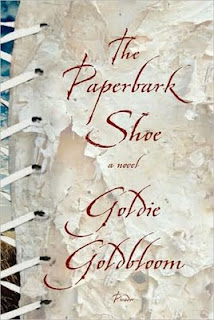Review: A fierce, consuming desire to belong
The original title of "The Paperbark Shoe" (Picador, 384 pages, $15), Goldie Goldbloom's searing first novel, was "Toad's Museum of Freaks and Wonders" and the book is full of all three, but perhaps the freakiest wonder of all is how the author summons up the landscape of the Australian wheat belt. Gin Toad, a cultured and musically talented woman, has landed in this parched land alone except for an incommunicative, short man named Toad. She's not without a sort of numbed pride in her survival:
"These are the things I learned to do after coming to Wyalkatchem: ... how to make a bread pan out of an old kerosene tin, how to make yellow soap from ash and lye and fat ... how to split wood with an axe ... how to cook on a woodstove ... how to treat burns ... how to treat a man ... how to push out a baby ... how to cut an umbilical cord with the knife used for castrating the lambs."
She's even learned to forget her life as a piano prodigy and accept a land made of "the hot smell of red dirt, the taste of the sky like salt from the sea."
But as World War II comes to a close, Gin and Toad take in two Italian prisoners of war as workers, and Gin's longing for escape turns into an all-consuming obsession for the sensitive and musical craftsman Antonio. This is no bodice ripper, however, and Gin is no dewy-eyed romance heroine. Her need to belong is so fierce that it's akin to madness. This longing, like the landscape, is fierce, selfish and without pity. As things progress, Gin loses our unconditional sympathy, becoming more interesting the farther she descends into her delusional and possessive love. We don't always identify with her; there's a Madame Bovary-like disregard in her behavior for her children's welfare and her husband's feelings. There is, however, an awful grandeur in the very wildness of her longing.
Why she does what she does, however, is never in doubt when highlighted against the area's only town, a smirking, loathsome little hell buzzing with bigotry and ignorance. This is a town where people walk up to her and touch her shoulder, saying, "There, that's good luck."
"It's not good luck to touch an albino," she hisses, and touches them back. "But maybe it's good luck to touch an idiot."
For all her underdog gumption, she has no sympathy for her husband, whose near-dwarf stature makes him the butt of cruel jokes. Nor does she refrain from bigotry of her own regarding her husband's love for a beautiful young man. Besides being a product of her time, Gin's own desire to be free of pain leaves no room for anyone else. This is where the book is at its bleakest and most believable. Suffering ennobles no one -- it only makes people desperate for any kind of pleasure. As the tension torques between the characters, the reader starts to sense an evil, selfish weight settling down in the small quarters they share.
The denouement of the book, which is mostly contained in the epilogue, is slightly weak compared with the rest. By inserting an actual historical atrocity, Goldbloom attempts to link emotional cruelty to actual horror. Horror, in fact, is the tonic that finally gives her the perspective to live her life. To use documented horror as a tool for personal epiphany is always a bit unbalanced, if not suspect. But this is a good enough book to withstand a flaw or two. It disturbs, like the cry of a wild bird on a hot afternoon, as if there were something that was either beautiful or savage nearby.
Emily Carter is the author of "Glory Goes and Gets Some."
Star Tribune
Updated: July 5, 2011 - 1:37 PM












0 comments:
Post a Comment